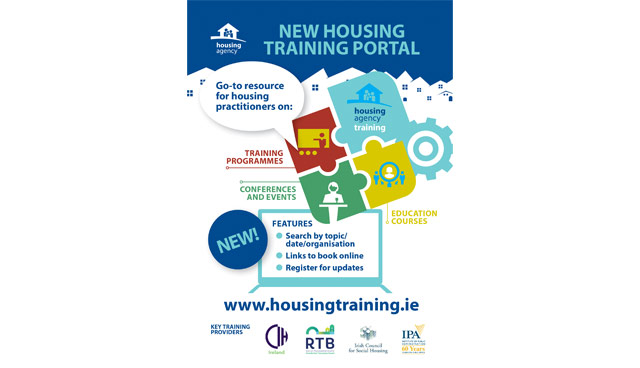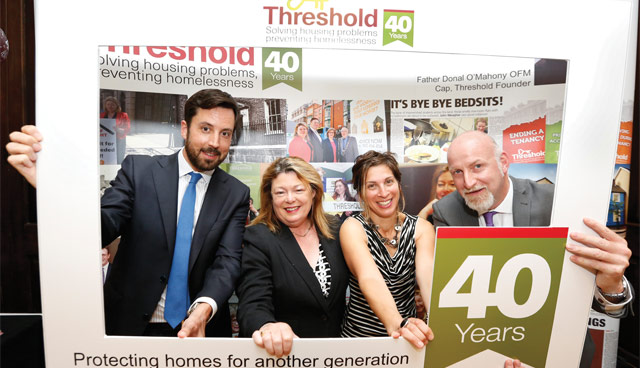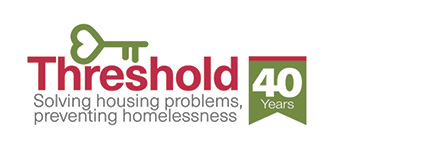
Round table discussion: Closing the Acorn Housing financing and the future funding of social housing
1st August 2018
Training the Housing Professional
1st August 2018Protecting homes for generations

John Mark McCafferty, Chief Executive of Threshold, outlines the charity’s work in protecting and supporting tenants for over 40 years.
The Private Rented Sector in Ireland, through both boom and bust, has undergone significant changes since Threshold was first established four decades ago. Threshold owes its origins to the development of the Flat Dwellers’ Chaplaincy established in 1974 by Fr Donal O’Mahony in response to the scale and diversity of housing problems at that time. Discrimination in terms of access to rented accommodation, illegal evictions and poor living conditions were widespread and between 1978 and 1980 we dealt with over 3,000 cases.
Up until the 1980s, the private rented sector was generally of ageing stock and poorly maintained. Legislative measures such as Section 23 and Section 27 in the 1980s, offering generous capital expenditure and tax reliefs, provided an incentive for the development of accommodation to let. However, aside from the requirement to rent for 10 years there were no provisions to encourage renting to those in receipt of Supplementary Welfare Allowance (SWA) rent supplement or to families and individuals on lower incomes, who had little option but to be squeezed into poorer quality accommodation. The current incentives to invest in purpose-built student accommodation serves as a timely reminder of the mistakes of the past, as we currently fail to cater for those on low incomes, the working poor, single people and older people, all of whom have housing needs yet to be met or developed through incentives.
The issue of standards remains one of our most common complaints as evidenced by some of our clients interviewed on the ‘Nightmare to Let’ documentary which aired on national television last November. Threshold has been calling for a certification system to replace the existing inspection and enforcement system. This would, in effect, operate like an ‘NCT’ for private rented housing whereby a landlord would not be allowed to rent a property unless it met minimum legal standards and that he or she held a certificate confirming this. While housing supply and affordability are key concerns for government, this cannot be at the expense of minimum standards in private rented housing. It is totally unacceptable that people are forced to live in windowless flats, sleep in bedrooms covered in mildew or make do without hot running water. Local government must ensure minimum standards are strictly adhered to, and that there are consequences for landlords who do not meet these standards. It is important that they not only investigate complaints regarding standards in private rented properties, but also proactively carry out inspections. Priory Hall and Grenfell Tower are both cases in point.
From a sector which had fallen significantly in size, Ireland’s Private Rented Sector (PRS) is now close to the European median and provides a home for at least 20 per cent of all households in Ireland. However, we have a growing population of people who are ‘flat broke’, unable to afford to rent or save for a deposit and ineligible for public housing, even if this was available. They are increasingly likely to be squeezed into overcrowded and / or sub-standard accommodation.
Overcrowding in rented accommodation has recently come into sharp focus and yet there is a lack of any proper legal definition. We continue to advocate for legislative changes so that such a definition can be inserted into minimum standards legislation.
Threshold cautiously welcomed the recent proposals to strengthen tenants’ rights in a volatile housing market through greater information on rents paid – although more granular detail is required on rents levied at individual property level. Regularly updated information on individual rents is needed before rent transparency can be said to be achieved. Rent Pressure Zones need to be accompanied by a detailed rent register and the introduction of indefinite tenancies before they can be truly effective.
The sale by Permanent TSB and Ulster Bank of non-performing home loans is a matter of grave concern. A code for buy-to-let arrears, similar to the Code of Conduct for Mortgage Arrears (CCMA) for residential mortgages, would introduce a transparent process for financial institutions, landlords and tenants; set out the required steps for engagement with the landlord and tenant and the forms of communication required; and ensure that financial institutions respect and uphold tenants’ rights.
As the housing crisis continues, Threshold provides a nationwide Tenancy Protection Service (TPS) to help prevent homelessness among families and individuals. Last year we dealt with 10,460 new TPS clients. The scarcity of rental property means that moving accommodation is no longer an option for many, so it is now more important than ever that tenants get the support they need to sustain their existing tenancies in both urban and rural areas. Our service can be accessed by a Freephone number – 1800 454 454 – and operates Monday to Friday from 9am-9pm.
An important element of the service is to intervene in cases where families in receipt of Rent Supplement are in danger of losing their homes, where individual Rent Supplement uplifts can be made.
We have seen some housing problems solved while others continue to get worse over the last 40 years. We remain proud of our track record and successes such as our campaign for mandatory rent books and the demise of bedsits. We are grateful for the support from the Department of Housing, Local Authorities and the ongoing generosity of our donors and supporters. The future holds many challenges – however, we are ready to respond to new and emerging problems with fresh thinking and renewed vigour – protecting homes for another generation.
 John Mark McCafferty
John Mark McCafferty
Chief Executive, Threshold
21 Stoneybatter, Dublin 7
T: 00 353 1 635 3606
E: john-mark@threshold.ie
W: www.threshold.ie
www.facebook.com/Thresholdire
@ThresholdIRE
Find us on LinkedIn






